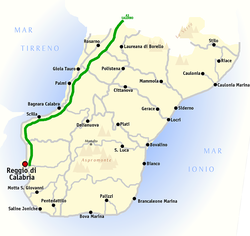Platì
| Platì | ||
|---|---|---|
| Comune | ||
| Comune di Platì | ||
|
||
 Map of the province of Reggio Calabria |
||
| Location of Platì in Italy | ||
| Coordinates: 38°13′N 16°03′E / 38.217°N 16.050°ECoordinates: 38°13′N 16°03′E / 38.217°N 16.050°E | ||
| Country | Italy | |
| Region | Calabria | |
| Province / Metropolitan city | Reggio Calabria (RC) | |
| Area | ||
| • Total | 50 km2 (20 sq mi) | |
| Population (January 1, 2009) | ||
| • Total | 3,762 | |
| • Density | 75/km2 (190/sq mi) | |
| Time zone | CET (UTC+1) | |
| • Summer (DST) | CEST (UTC+2) | |
| Postal code | 89039 | |
| Dialing code | 0964 | |
| Patron saint | Mary Our Lady of Loreto | |
| Saint day | December 9 | |
| Website | Official website | |
Platì (Greek: πλατύ platý “wide; the plain”) is a town and comune (municipality) in the province of Reggio Calabria, in Calabria, southern Italy. It rises 300 metres (980 ft) above sea level on the slope of the Aspromonte mountains and is located next to the Aspromonte National Park. The town is well known for its bread.
Platì was founded in 1505 when Ferdinand II of Aragon granted the fief Platì and Santa Barbara to Carlo Spinelli, prince of Cariati. The small hamlet that was set up was named Platì in 1704. The area was apparently populated by ex-convicts from the prison of Reggio Calabria as a kind of penal colony. The population was mainly employed in sheep husbandry.
An earthquake on February 5, 1783, partially destroyed the town, killing 25 people. The area is prone to floods and landslides and was hit in 1848, 1861, 1870, 1908, 1951, 1953, 1958, 1972 and 1973.
On October 16–18, 1951, the town was hit by a floods from the Careri river and landslides, partially destroying the town and leaving 18 people dead. Many people decided to leave and headed north to Turin and Milan or emigrated, in particular to Australia. In 1953 an 1958 the town was hit again by floods. Many of the migrants to Australia ended up in Griffith, New South Wales and made the area into an important wine producing region.
Plati is notorious for being a center of the powerful 'Ndrangheta, the Calabrian organized crime organization. The town has been called the "cradle of kidnapping" and it is suspected that kidnap victims were held within underground hide-outs. The wealth of the crime families is well hidden, and the municipality is officially the one with the lowest per capita income in Italy. In a large scale operation in the night of 13 November 2003, thousands of carabinieri stormed the town, discovering hidden underground rooms and hallways and arresting 131 people.
...
Wikipedia


